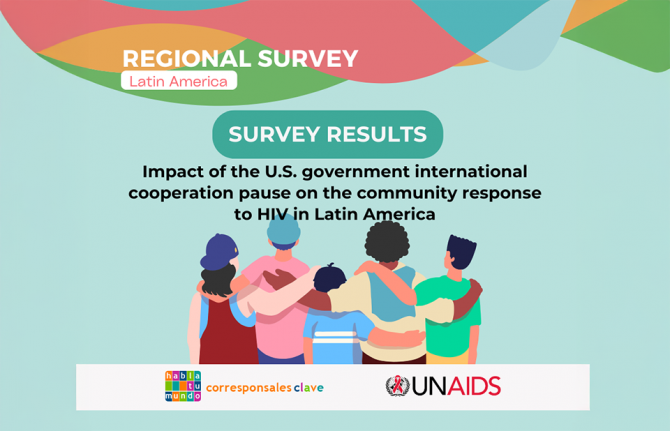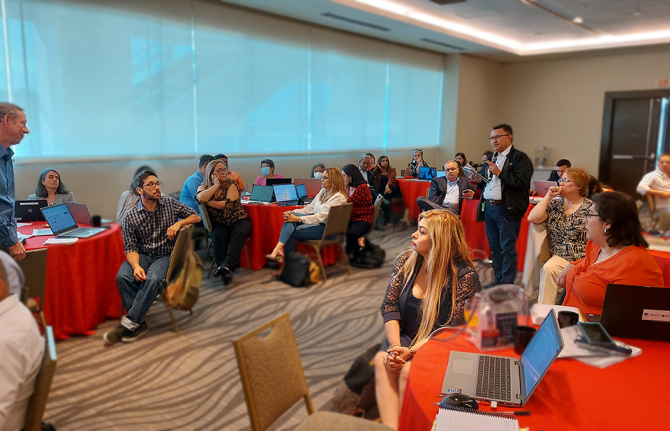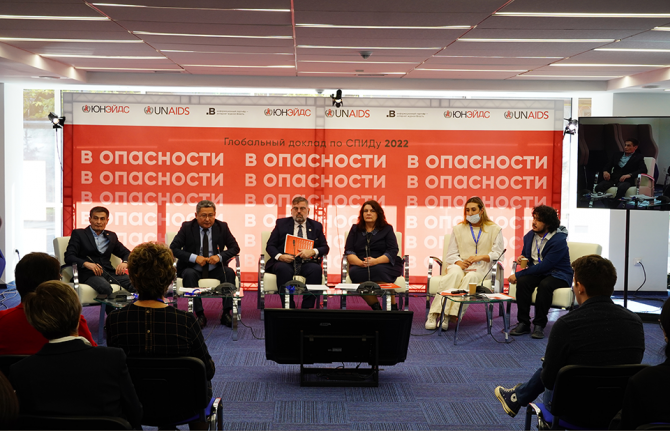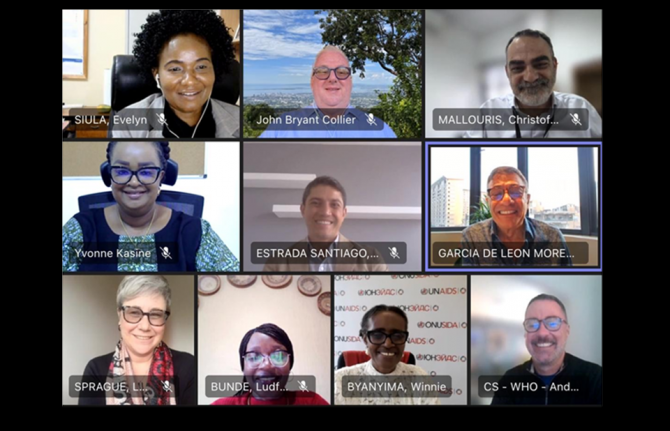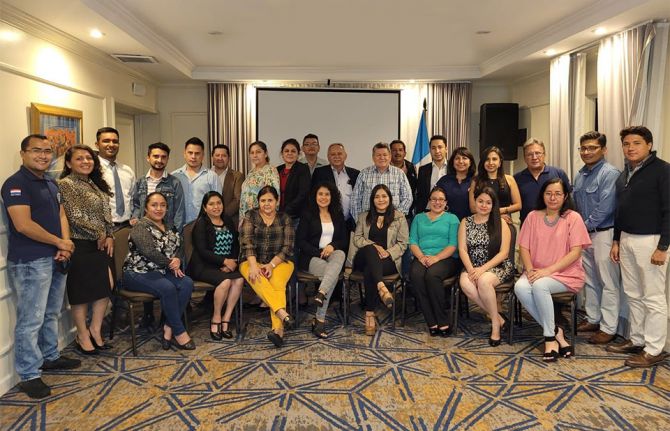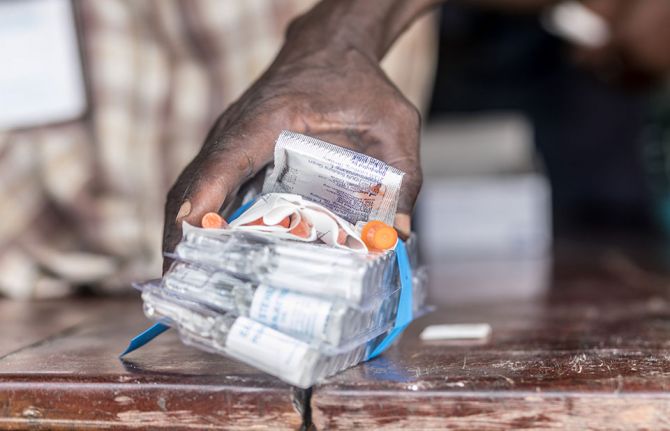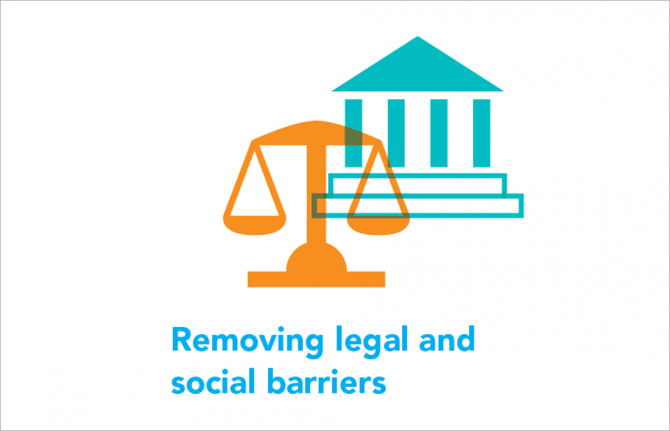
Feature Story
Positive Leadership Summit 2008
31 July 2008
31 July 2008 31 July 2008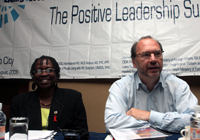
Deborah Williams, Chair of the Global Network of People Living with HIV and AIDS (GNP+) (left) and Dr Peter Piot, UNAIDS Executive Director at opening of Living 2008
Credit: UNAIDS/Agencialibre Fotografía
UNAIDS Executive Director delivers plenary speech at Summit opening.
350 HIV-positive global leaders and advocates from 88 countries have come together to discuss a range of issues in the AIDS reposnse impacting people living with HIV worldwide.
Read press release
View photo gallery

Kate Thomson, Chief of Civil Society
Partnerships at UNAIDS
30 July 2008
Kate Thomson is Chief of Civil Society Partnerships at UNAIDS. She has been involved in AIDS activism for over twenty years - firstly in the UK, where she helped set up the first positive women's organization - and then internationally through work with the international people living with HIV conferences, the Global Network of People Living with HIV/AIDS (GNP+) and the International Community of Women living with HIV (ICW). She is also a founder member of UN+.
Ahead of the Positive Leadership Summit which will begin in Mexico City on 31 July, unaids.org asked Kate to reflect on the changing leadership role of the global positive community and today’s outstanding issues.
Kate, you have been involved in AIDS activism for many years, what progress have you seen over this time?
The changes are phenomenal. Back when I first got involved in early 1987 there was a lot less hope. There were far fewer positive activists and the vast majority were northern gay men - almost no positive women were involved. We were determined to do something – to ask questions and demand answers, to push for better services and support, better science and treatment that worked, to push for policies that protected us against the discrimination and human rights violations that our friends were experiencing on a daily basis. This is still the reality for many people living with HIV (PLHIV) around the world.
However, for a fortunate and relative few, we are alive to see the results of our activism, receiving the services we were fighting for, and becoming increasingly involved in creating the policies in our countries and globally. Furthermore, over the years, we have seen more activists from the South become involved in global advocacy. Holding the PLHIV conferences outside of Europe was an important step in recognizing and encouraging this process.
The 2001 UN General Assembly Special Session on HIV/AIDS (UNGASS) and the Declaration of Commitment provided our communities with a tool with which to hold our governments accountable and strongly articulated the necessity of creating partnerships with PLHIV and other key populations. The establishment of the Global Fund gave us the means to raise and distribute far larger amounts of money for AIDS (and TB and malaria) than we’d ever have imagined a short time before.
Most of the activism that happens occurs at grassroots level and seldom gets acknowledged at the international level or feeds into global policy discussions. This is one of the greatest weaknesses and challenges that the global PLHIV movement faces. Strengthening those links between the local, regional and global levels is something that will continue to be an ongoing struggle for PLHIV networks in the foreseeable future.

The LIVING 2008 Positive Leadership Summit will begin on 31 July in advance of the XVII International AIDS Conference. Can you tell us about the significance of this event?
Given the current climate where the rights of PLHIV are being eroded in many areas, where there is a growing complacency among donors regarding scaling up towards universal access and a false perception that the AIDS crisis is over, its essential that PLHIV come together and, as the title of the Summit states, reclaim the advocacy agenda for ourselves rather than continue to let others define some of the most critical issues we are facing.
It’s important that we can go into the International AIDS conference with a revitalized collective voice around these issues and that we are able reenergize the debate once we return to work with local positive communities in our countries.
What are the priority issues for the movement of people living with HIV?
Well, if you look at the agenda for the Leadership Summit you will see four main issues highlighted.
- Universal access to HIV treatment, care and prevention programmes
- Positive Prevention
- Sexual and reproductive health and rights of people living with HIV
- Criminalization of the transmission of HIV
Cross cutting issues include leadership, women and most at-risk groups, while overarching issues will include addressing gender inequality, increasing involvement of young people living with HIV; stigma and discrimination; the greater involvement of people living with HIV (GIPA); and creating effective partnerships.
The list is of course not exhaustive. For instance, some of the other issues of great concern to the PLHIV movement include: the fact that some governments are turning their backs on commitments made around universal access; that we still need to ensure adequate funding for AIDS programming and that the money raised reaches the populations most in need; that funding for health systems should not be pitted against funding for AIDS; and that broader human rights issues affecting PLHIV and key populations are addressed and protected.
People living with HIV are increasingly recognized as a vital part of global and local HIV responses. Is GIPA (the greater involvement of people living with HIV) actually happening?
A lot of lip service has been paid to the greater or more meaningful involvement of PLHIV in the response but in reality progress is slow. In the early days just being openly living with HIV was sometimes seen as enough reason to invite someone to the table. But what is clear now is that relevant skills and professionalism are essential or otherwise our presence is tokenistic. The lack of meaningful participation at country level due to lack of capacity of PLHIV networks is a common problem. For this reason, it’s essential that the involvement of PLHIV in all aspects of the response be adequately funded. This must include training in all technical areas, including policy work.
What unites the positive community, transcending all borders and backgrounds? Is there such as a thing as a shared strategy within the global PLHIV movement?
Of course just because we are living with HIV doesn’t make us all agree on everything!
However, there are some experiences that do create a unique bond. I’d say I have a special relationship with those PLHIV who I’ve known since the mid 1980s. We may disagree, but it’s like a family that’s been through tremendous pain and loss, but also survived and collectively achieved so much in spite of the odds. For this reason we will always be linked.
If you think about the global PLHIV movement, although we are talking about massively larger numbers of individuals involved, some of those elements are still there. Shared common experience of real or perceived stigma, of fear of illness and dying, of collectively fighting for something you believed in – and a tremendous will to live and enjoy life to the full. These are all common threads that weave in and out of our lives.
When it comes down to holding particular positions on issues such as testing, positive prevention and so on it’s less easy to achieve consensus, but nonetheless, I think the overall commitment to upholding the human rights of PLHIV is a uniting factor – as is the belief in universal access to prevention, treatment, care and support.
What is UNAIDS participation in the event?
UNAIDS is a member of the Living Partnership, a group of organizations who are committed to the right of PLHIV to self determination and that the meaningful involvement of those living with HIV in the AIDS response is crucial to its success.
UNAIDS staff members have participated on the working groups organizing this event and media from day one. Several of us attended the planning meeting for Living 2008 that took place in Monaco in January of this year hosted by HSH Princess Stephanie of Monaco (a UNAIDS Special Representative) and Fight AIDS Monaco.
During the event our Executive Director Peter Piot will speak at the opening plenary and Special Representative HSH Princess Stephanie will address the meeting through a video message.
For all of us, being a part of this event has been a priority – leadership of people living with HIV is obviously an issue close to our hearts as PLHIV, but also a priority for the UNAIDS programme as a whole.
Finally, what are your hopes for the future? What would you like to see on the agenda of “Living 2018”?
By 2018 I hope we will be talking about effective vaccines and microbicides and new and effective drugs for TB and hepatitis C as well as for HIV.
I hope that the stigma that surrounds HIV will no longer exist — that discrimination doesn’t continue killing people just because they are somehow different and that GIPA will be a redundant concept.
I hope it will no longer be necessary to hold these meetings, that AIDS activism will be a thing of the past and that we will all have moved on to new areas of work – but this is probably far too wishful thinking.
Positive Leadership Summit 2008
Partners:
Living 2008: The Positive Leadership Summit
Feature stories:
Leadership and AIDS: Patricia Pérez (03 April 2008)
Leadership and AIDS: Gregg Gonsalves (09 May 2008)
HIV positive leaders meeting in Monaco (25 January 2008)
External links:
Global Network of People Living with HIV/AIDS (GNP+)
International Community of Women Living with HIV/AIDS (ICW)

Feature Story
MSM and the global HIV epidemic
31 July 2008
31 July 2008 31 July 2008
Ahead of AIDS 2008, a two day forum being
held in Mexico will focus on men who have
sex with men and HIV.
The up-coming XVII International AIDS Conference (IAC) begins 3 August in Mexico City. It is the first time that the world’s largest HIV forum is being held in Latin America giving the opportunity for regional HIV issues to be highlighted.
No single factor impacting the epidemic in Latin America is more in need of focus than men who have sex with men (MSM). At least a quarter of HIV infections in the region are related to sex between men but social taboos largely prevent sustained discussion on the issue and have inhibited efforts to promote safer sexual relations.
In particular, unprotected sex between men is an important factor in the epidemics of Bolivia, Chile, Ecuador and Peru in South America, as well as in several Central American countries, including El Salvador, Guatemala, Honduras, Mexico, Nicaragua and Panama.
Against this background a pre-conference affiliated event “The Invisible Men: Gay Men and other MSM in the Global HIV/AIDS Epidemic”, will be hosted by Global Forum on MSM and HIV on 1-2 August in Mexico City.
The Global Forum on MSM and HIV
The Global Forum on Men Who Have Sex with Men and HIV was first convened at the 2006 International AIDS Conference in Toronto. It is a network of civil society groups, AIDS organizations, MSM groups and other agencies that works at global and national levels to advocate for improved HIV programming specifically for MSM. The Forum was formed in response to a shared concern that current HIV strategies do not adequately address the needs of men who have sex with men and that the gaps are due to persistent denial and human rights abuses.
“Across the world, effective HIV responses meeting the needs of men who have sex with men have been neglected. Today there is a real willingness to start to overcome that quarter of a century of neglect, and the Global Forum and this meeting will give a strong focus where and how action is most urgent,” Michael Bartos, UNAIDS Prevention Chief.
The two day forum will focus on coordinating a response to the large gaps in funding and services that currently exist for MSM living with and at risk for HIV and call for a scale up HIV funding and human rights protections for men who have sex with men. UNAIDS Executive Director Dr Peter Piot will address the forum.
Human rights and social justice are key to the health and well being of men who have sex with men and other sexual and gender minorities. Stigma and discrimination contributes to the spread of HIV by creating a culture of secrecy and shame that makes it difficult to effectively educate communities on risk behaviours.
MSM and the global HIV epidemic
Feature stories:
Strengthening work with MSM in Africa (23 May 2008)
Global initiative to stop the spread of HIV among men who have sex with men (24 July 2007)
External links:
Publications:
Practical guidelines on HIV prevention
Men who have sex with men, HIV prevention and care (pdf, 638 Kb)
Related

Feature Story
UNAIDS launches new report on global AIDS epidemic
29 July 2008
29 July 2008 29 July 2008
The report was launched at UN HQ in NY (from right) UNAIDS Executive Director Dr Peter Piot; Executive Director of the United Nations Population Fund, Thoraya Obaid and Administrator of the United Nations Development Programme, Kemal Derviş
Credit: UNAIDS/B. Hamilton
Significant gains in preventing new HIV infections are being seen in a number of countries most affected by the AIDS epidemic. This is according to a new report released today by UNAIDS.
The report highlights specific examples of countries which are seeing changes in sexual behaviour followed by declines in the number of new HIV infections. Findings include increasing condom use among young people with multiple partners and encouraging signs that young people are waiting longer to have sexual intercourse in some of the most heavily affected countries.
However, the report also shows that despite the declines in new HIV infections the AIDS epidemic is far from over and that rates of new HIV infections are rising in many countries. AIDS also continues to be the leading cause of death in Africa.
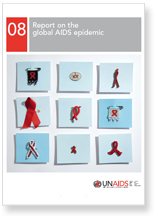
2008 report on the global AIDS
epidemic
The report outlines that AIDS is a long-term issue requiring a response grounded in evidence and human rights and one that requires strong leadership and sustained financing.
The UNAIDS report clearly shows that stronger measures are needed to turn the epidemic around and that ‘knowing your local epidemic’ remains critical to an effective response.
The 2008 Report on the global AIDS epidemic is the most comprehensive report on the response to AIDS. It includes data from 147 countries against 25 core targets set in the UN declaration of Commitment on HIV/AIDS adopted in 2001, and the political declaration adopted at the 2006 High Level Meeting on AIDS. The information presented in the report enables readers to assess progress made since 2001 and identify the strengths and weaknesses of the AIDS response to date.
UNAIDS launches new report on global AIDS epidemi
Multimedia:
Photo gallery of report launches
Watch webcast of the New York launch of 2008 report on the global AIDS epidemic with UNAIDS Executive Director Dr Peter Piot
Selection of photographs from 2008 Report on the global AIDS epidemic
Watch video: Voices from a world with AIDS
Photo gallery

Publications:
Related
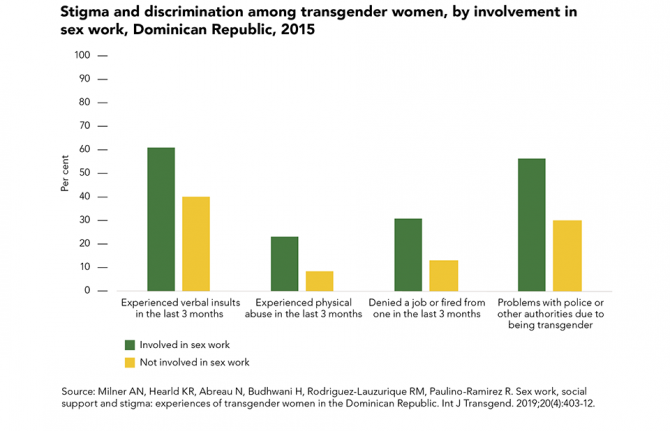 Transgender sex workers face frequent abuse
Transgender sex workers face frequent abuse

29 March 2022

Feature Story
Anti-stigma campaign to be launched at Mexico AIDS Conference
28 July 2008
28 July 2008 28 July 2008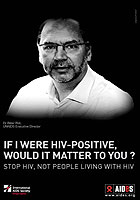
UNAIDS Executive Director
Dr Peter Piot
Photo credit: IAS/AIDES
AIDES, the French national AIDS association, and the International AIDS Society (IAS) have joined forces to denounce stigma and discrimination against people living with HIV through an awareness campaign titled “If I were HIV-positive”.
To be launched at the upcoming XVII International AIDS Conference in Mexico City, the campaign will raise awareness around several key issues in the AIDS response, from HIV-related travel restrictions and access to antiretroviral treatment to AIDS in the workplace.
Participating in the campaign from UNAIDS are Executive Director Dr Peter Piot, Kate Thomson, Chief of Civil Society Partnerships, and UNAIDS Special Representative Her Royal Highness Crown Princess Mette-Marit of Norway. Other participants include the Executive Director of the Global Fund to Fight AIDS, Tuberculosis and Malaria, Dr Michel Kazatchkine, AIDES President Bruno Spire, and IAS Executive Director Craig McClure and IAS President elect Dr Julio Montaner. Several other prominent figures from civil society and Latin America are also participating.

UNAIDS Special Representative
Her Royal Highness Crown
Princess Mette-Marit of Norway
Photo credit: IAS/AIDES
Delegates at the conference will be invited to have their photo taken at either the IAS’ and AIDES’ exhibition booth and have the opportunity to create their own campaign visual.
This initiative continues on from the high impact “Si j’étais seropositif” campaign which ran in France during the French presidential elections in 2007 and which featured current French President Nicolas Sarkozy and former presidential candidate Segolène Royal.
Anti-stigma campaign to be launched at Mexico AID

Feature Story
Strengthening the AIDS response in Portuguese speaking countries
28 July 2008
28 July 2008 28 July 2008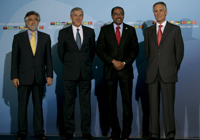
(L to R): Luís Amado, Minister of Foreign
Affairs of Portugal; José Sócrates, Prime
Minister of Portugal; Michel Sidibè,
UNAIDS Deputy Executive Director;
Aníbal Cavaco Silva, President of the
Republic of Portugal- during the VII
CPLP’s Heads of State Summit.
Photo: Luis Filipe Catarino
The Community of Portuguese Speaking Countries (CPLP) Heads of State’s Summit took place on 24 and 25 July in Lisbon, Portugal. The summit, which happens every two years, is an opportunity to review progress made and to improve cooperation between CPLP Member States on political, economic, social and cultural issues. One of this year’s topics was dedicated to the improvement of cooperation in the AIDS response.
The summit brought together representatives of CPLP’s Member States (Angola, Brazil, Cap Vert, East Timor, Guinea Bissau, Mozambique, Portugal and Sao Tome e Prince), Observer States (Guinea Equatorial, Mauritius, Senegal) and representatives from international organizations (Africa Union, FAO, UNESCO, UNAIDS, CEDEAO, UNASUL).
UNAIDS Deputy Executive Director Michel Sidibe participated in the CPLP summit as a keynote speaker at the Civil Society Forum on Health Affairs. This side event was an initiative of Former President Sampaio, CPLP’s Goodwill Ambassador for Health Affairs and United Nations Special Envoy to Stop TB.
At the summit, UNAIDS and CPLP announced a new partnership as a result of the existing engagement and collaboration between CPLP’s countries and UNAIDS. This collaboration was reflected in the launch of a new report by CPLP highlighting progress made towards universal access to treatment, prevention and care in the CPLP’s countries. Furthermore, the Ministers of Foreign Affairs of the eight Member States also approved an AIDS declaration during the summit.
In order to further highlight the issue of HIV during the Summit and to foster a new generation of leaders committed to the AIDS response, UNAIDS in partnership with the CPLP and National Portuguese Television (RTP) held a televised town hall on AIDS.
“Alerta Sida”, “Aids Alert” was broadcasted on 23 July, the eve of the Summit, by RTP AFRICA and RTP International.
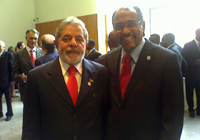
UNAIDS Deputy Executive Director Michel
Sidibè with Lula da Silva, President of
Brazil - during the 2008 Community of
Portuguese Speaking Countries (CPLP)
Heads of State’s Summit. 24 and 25 July
Lisbon, Portugal. Photo: UNAIDS
University students from different CPLP countries put a series of questions to a panel of experts representing the CPLP, technical programming and civil society.
The panel answering students’ questions were CPLP Executive Secretary Ambassador Luís Fonseca (Cape Vert); Portugal’s National AIDS Coordinator Professor Henrique de Barros; and General Coordinator of Abia (a Brazilian non-governmental organization) Dra. Cristina Pimenta.
Video messages from some CPLP Heads of State; UNAIDS’ Deputy Executive Director, Michel Sidibe and Former President Sampaiom, CPLP’s Ambassador for Health Issues were also broadcasted.
This initiative also had the support of Lusófona University.
The 80 minute programme included a short report about the AIDS epidemic in Mozambique, the Portuguese-speaking country with the highest numbers of people living with HIV.
Strengthening the AIDS response in Portuguese spe
Related
 “Who will protect our young people?”
“Who will protect our young people?”

02 June 2025

Feature Story
“YouthForce”: The Power of Youth at AIDS 2008
25 July 2008
25 July 2008 25 July 2008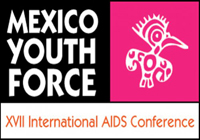
With the up-coming AIDS 2008 in Mexico,
YouthForce has a chance to empower more
young people, advocate for critical issues
affecting youth worldwide, and further
pinpoint strategies for effective change.
It is often said that young people are the future, however they are also very much the present. The United Nations Population Fund (UNFPA) estimates that today’s generation of young people is the largest youth cohort in history. Nearly half of the world’s population is under the age of 25, 85% of which live in developing countries.
Today’s youth are one of the most socially conscious and active segments of the population. Nowhere will this be more apparent than at the up-coming XVII Mexico City International AIDS Conference. As the largest international gathering on a health-related issue, the biennial conference has always served as a landmark event for the AIDS community.
Since the Barcelona AIDS Conference in 2000, YouthForce, a coalition of youth and youth-serving organizations, have been coming together to ensure that youth issues and youth participation are well represented at the event.
AIDS 2008
With the up-coming AIDS 2008 in Mexico, YouthForce has a chance to empower more young people, advocate for critical issues affecting youth worldwide, and further pinpoint strategies for effective change. Since January 2008, several different YouthForce sub-committees have been busy working on the various activities and initiatives planned for Mexico City. YouthForce key activities include the Youth Pre-Conference and Youth Pavilion.
In order to promote and strengthen young delegates' meaningful participation in the 2008 conference, the Mexico YouthForce is coordinating a three day pre-conference event, from 31 July-2 August for approximately 250 young HIV activists.
The Youth Pavilion will not only provide a space for young people to showcase their work on HIV issues, but will also support youth delegates at the conference. All young people attending the conference are invited to join the YouthForce activities.
For young people who are unable to attend the conferences there are also ways to get involved. To find out more about these opportunities visit AIDS 2008 Youth site (on english and spanish languages)
YouthForce
In addition to working on ensuring youth participation and effective programming at the International AIDS Conferences, the YouthForce helps young leaders advocate on issues relevant to them such as the rights of young people living with HIV and the criminalization of young sex workers and injecting drug users.
“The YouthForce is a wonderful example of groups from all over the world who work on HIV and sexual reproductive health issues coming together to create meaningful opportunities for young people to take action in their countries and communities,” said Joya Banerjee, Programme Coordinator and Cofounder of the Global Youth Coalition on HIV/AIDS.
“Through the YouthForce, young leaders are trained, they have an opportunity to network with each other, and learn how to create and run programmes and policies,” she added.
“YouthForce”: The Power of Youth at AIDS 2008
Cosponsors:
Partners:
Global Youth Coalition on HIV/AIDS
Feature stories:
From Rhetoric to Action: Youth Leaders High Level Session (13 August 2006)
External links:
YouthForce
AIDS in focus photography contest
International AIDS conference 2008
Related
 “Who will protect our young people?”
“Who will protect our young people?”

02 June 2025

Feature Story
STI Online: Supplement on UNAIDS estimation methods and tools
25 July 2008
25 July 2008 25 July 2008
UNAIDS will publish the
2008 report on the global
AIDS epidemic on
Tuesday 29 July.
Ahead of the publication of the 2008 Global Report, Sexually Transmitted Infections, a peer review journal for health professionals and researchers in sexual health has published a supplement giving a description and underlying data for UNAIDS estimation methods and tools, as well as analyses on a range of epidemiological issues including quantifying HIV burden in emergencies, the quality of global serosurveillance and a method for estimating averted infections.
UNAIDS will publish the 2008 report on the global AIDS epidemic on Tuesday 29 July. This year’s report will feature updated global and regional epidemiologic estimates on HIV and new trends in the epidemic’s evolution and will provide data and analysis on the 25 UNGASS indicators reported on by countries.
Extract
“While the 2007 AIDS Epidemic Update report noted that the downward adjustments were the result of better data leading to changes in assumptions and thereby estimates, we recognize the need for the highest level of transparency and opportunity for scientific critique.
Since 2004 we have provided detailed descriptions of the tools and assumptions used in generating HIV and AIDS estimates, as well as the data and analyses underpinning these assumptions. This supplement assembles important new data relating to several assumptions used for the new HIV and AIDS estimates. By bringing together a new collection of methodological papers in this supplement, we aim to provide easy access to the scientific basis underlying the latest HIV and AIDS estimates for 2007.”
Read full supplement:
Improved data, methods and tools for the 2007 HIV and AIDS estimates and projections (STI Online. Copyright © 2008 by the BMJ Publishing Group Ltd.)
STI Online: Supplement on UNAIDS estimation metho
Publications:
Improved data, methods and tools for the 2007 HIV and AIDS estimates and projections (STI Online. Copyright © 2008 by the BMJ Publishing Group Ltd.)
Related
 Transgender sex workers face frequent abuse
Transgender sex workers face frequent abuse

29 March 2022

Feature Story
The Life Initiative – Hotels addressing AIDS
23 July 2008
23 July 2008 23 July 2008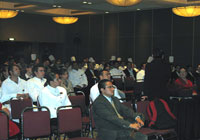 UNAIDS is involving the Mexican hotel industry in a prevention campaign around the International AIDS Conference in August 2008 and in the longer term through the development of sustainable long term HIV workplace policies & programmes Photo: UNAIDS/R.Castillo
UNAIDS is involving the Mexican hotel industry in a prevention campaign around the International AIDS Conference in August 2008 and in the longer term through the development of sustainable long term HIV workplace policies & programmes Photo: UNAIDS/R.CastilloThe International AIDS conference (AIDS 2008) will bring to Mexico approximately 20,000 delegates and 2000 journalists from all over the world from 3-8 August 2008. AIDS 2008 presents a unique opportunity to engage the local hotel industry on issues related to HIV.
UNAIDS and the Mexican hotel industry are launching an HIV prevention campaign entitled “The Life Initiative – Hotels addressing AIDS”. Aimed at hotel guests and staff the initiative will raise awareness about HIV prevention and non-discrimination of people living with HIV. The initiative will also promote the development of sustainable long- term HIV workplace policies and programmes in the hotels. The hotel industry is a key player in the response to AIDS as it can reach a wide and diverse audience with HIV prevention information including its large workforce.
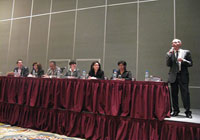 A first inaugural meeting of all the participating hotels took place at the Hotel Marquis in Mexico City on July 4th 2008. Photo: UNAIDS/R.Alion
A first inaugural meeting of all the participating hotels took place at the Hotel Marquis in Mexico City on July 4th 2008. Photo: UNAIDS/R.AlionThe prevention campaign will include the display of AIDS related leaflets, posters and brochures, art exhibitions, distribution of free male and female condoms, and showing of AIDS related films in all participating hotels. Condoms will be distributed at all participating hotels via the “condom project” which has been financed with the support from the United Nations Population Fund (UNFPA).
Sustainable long term HIV workplace policies and programs in hotels
One of UNAIDS’ partners in this initiative, IMPULSO - a network of NGOs experts on the provision of technical assistance on HIV in the workplace – will provide capacity building trainings which include situational analysis, stigma and discrimination program and HIV policy and program development. IMPULSO’s specific workshops in hotels also include training in the use and implementation of a software called Workplace Policy Builder designed to assist companies in developing their own AIDS policies.
 Condoms will be distributed at all participating hotels via the “condom project” which has been financed with the generous support from UNFPA. Photo: UNAIDS/R.Castillo
Condoms will be distributed at all participating hotels via the “condom project” which has been financed with the generous support from UNFPA. Photo: UNAIDS/R.CastilloMore than 5,100 hotel employees have already been trained, covering 7,738 rooms in hotels in Mexico City. They received education information on HIV prevention, an overview of the epidemic in Mexico, and were sensitized on issues related to stigma and discrimination in the workplace.
“In Mexico, we note that nearly 200,000 people are living with HIV and around 5,000 people died in 2006 from diseases related to AIDS. The XVII International AIDS Conference presents a unique opportunity to involve the local hotel industry on issues related to HIV,” said UNAIDS Director of Regional Office for Latin America and the Caribbean, Cesar Nuñez.
All partners will announce the launch of the initiative around a press event on 06 August 2008 at 09:00- the International AIDS Society’s press center. For further information please contact UNAIDS Chief of Private Sector Partnerships, Regina Castillo (castillor@unaids.org)
|
Hotels participating in the “Life Initiative- Hotels addressing AIDS” For this initiative, the official AIDS 2008 international & national hotel chains have been targeted. The 5 national hotel chains are: Grupo Posadas, Hoteles Misión, Grupo Empresarial Ángeles, Grupo Del Ángel and Grupo Hoteles Emporio. The 8 international hotel chains are: Best Western International, InterContinental Hotels Group, Starwood Hotels & Resorts, Sol Melia Hotels & Resorts, Radisson Hotels & Resorts, Ramada International, Group ACCOR and Four Seasons Hotels. So far the following hotels have joined the initiative: NOVOTEL STA FE HOTEL GRAN MELIÁ HOTEL RADISSON FLAMINGOS HOTEL FIESTA AMERICANA REFORMA HOTEL HOLIDAY INN REFORMA HOTEL EMPORIO FIESTA INN CENTRO HISTORICO HOTEL GENEVE HOTEL MARQUIS HOTEL HOLIDAY INN ZONA ROSA HOTEL FIESTA AMERICANA GRAND HOTEL CASABLANCA HOTEL EMBASSY SUITE EUROSTAR SUITE GRAN HOTEL DE LA CIUDAD DE MEXICO HOTEL CENTURY ZONA ROSA NOVOTEL PERINORTE NOVOTEL MONTERREY HOTEL CAMINO REAL HOTEL SHERATON CENTRO HISTORICO MEXICO |
The Life Initiative – Hotels addressing AIDS
Cosponsors:
International Labour Organization (ILO)
Partners:
IMPULSO / Ave de Mexico
CONAES
International AIDS Society (IAS)
Constella Group
Secretary of Tourism in Mexico
CENSIDA
Press centre:
Report finds that Business Coalitions are helping one million companies tackle AIDS in the workplace (24 Jan 2008)
Feature stories:
ILO sees significant improvement in workplace attitudes to HIV (25 April 2008)
Multimedia:
Watch video on the Life Initiative project
Publications:
ILO Code of Practice on HIV in the workplace
Photgallery
(See Powerpoint presentation)

Feature Story
International labour standard would strengthen the HIV response in the workplace
21 July 2008
21 July 2008 21 July 2008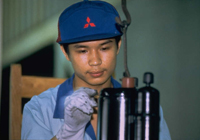
A majority of the 33 million people living
with HIV worldwide are working and in
their most productive years.
Photo: UNAIDS/ILO/C.Serge
A majority of the 33 million people living with HIV worldwide are working and in their most productive years. They generate much-needed income to support their families, and their skills and experience make a big contribution to their workplace and country. However, despite major advances in attitudes and knowledge about HIV, many workers still face discrimination, stigma and fear of losing their job.
Yet the workplace can be one of the most effective settings for responding to AIDS as it is a community where people come together to discuss and learn from one another. Existing structures and facilities such as occupational health services can also be used for HIV prevention, care and support services.
New international labour standard
To expand and strengthen the role of the workplace in the global response to AIDS, the International Labour Organization (ILO), which is a cosponsor of UNAIDS, has launched a process to adopt a new international labour standard in the form of an autonomous Recommendation.
International labour standards are legal instruments drawn up by the ILO's constituents —governments, employers and workers—and which set out basic principles and rights at work.
Strengthening the Code of Practice
If adopted, the new standard would complement, reinforce and extend the impact of the existing ILO Code of Practice on HIV/AIDS and the world of work, which focuses on the protection and promotion of rights and it would also strengthen the workplace contribution to achieving universal access to HIV prevention, treatment, care and support services.

Despite major advances in
attitudes and knowledge
about HIV, many workers still
face discrimination, stigma
and fear of losing their job.
Photo:UNAIDS/ILO/J.Maillard
The current ILO Code of Practice has been integrated into laws and policies in many countries, but because it is a voluntary instrument its uptake is optional. There is also no provision for monitoring the quality or extent of its use, as there would be in the case of a standard.
Although the implementation of a new standard would not be mandatory for member States, it would have to be submitted, once adopted, to national authorities “for the enactment of legislation or other action”. This will provide the ILO and its constituents with an opportunity to review action taken.
The standard presents a good opportunity for enhancing HIV support services in the workplace according to the Director of the ILO’s Programme on HIV/AIDS and the World of Work, Dr Sophia Kisting: “This standard setting process provides us with a special opportunity to work closely with different departments in the ILO, with our constituents, UNAIDS and with networks of people living with HIV. We are encouraged by the positive responses and support we have had, and look forward to the scaling up of concrete responses at the workplace through a strengthened legal-policy environment."
“HIV/AIDS and the World of Work”
The discussion of a new international standard is on the agenda for the 2009 and 2010 International Labour Conferences. In preparation for these discussions, the ILO has prepared an overview report “HIV/AIDS and the World of Work” which includes the most comprehensive compilation to date of national laws and policies on HIV, covering 170 countries.
The report finds that more than 70 ILO member States have, or are in the process of adopting, a general law on HIV, while 30 countries have adopted, or are in the process of adopting, specific workplace rules. Other countries deal with HIV under either equal opportunities or public health legislation, and some have integrated HIV into labour legislation.

the workplace can be one of the most
effective settings for responding to AIDS
as it is a community where people come
together to discuss and learn from one
another. Photo: UNAIDS/J.Spaull
This report and its accompanying questionnaire have been sent to the ILO's member States. Governments are to reply to the questionnaire in consultation with employers and workers which asks for their views on the scope and content of the proposed standard. Labour ministries are also advised to consult with other national ministries and institutions dealing with HIV, and to include organizations of people living with HIV and others engaged in national programmes.
Based on the responses to the questionnaire, a second report will then be produced with draft conclusions for discussion at the 2009 International Labour Conference, which will prepare the path for the adoption of the new international labour standard by 2010.
The “ILO Code of Practice on HIV/AIDS and the world of work” was adopted in 2001 in wide consultation with tripartite constituents in all regions. It has been translated into 57 languages to date. A framework for action related to the workplace, it contains principles for policy development and practical guidelines for programmes at enterprise, community and national levels and it covers in the following main areas:
- Prevention of HIV
- Management and mitigation of the impact of AIDS on the world of work
- Care and support of workers infected and affected by HIV/AIDS
- Elimination of stigma and discrimination on the basis of real or perceived HIV status.
International labour standard would strengthen th
Cosponsors:
Feature stories:
ILO sees significant improvement in workplace attitudes to HIV (25 April 2008)
Publications:
HIV/AIDS and the world of work (pdf, 742 kb)
ILO Code of Practice on HIV/AIDS and the world of work
Implementing the ILO Code of Practice on HIV/AIDS and the world of work: an education and training manual
Saving lives, protecting jobs. ILO/SHARE Report April 2008 (3.7 Mb, pdf) ( fr )

Feature Story
Third meeting of the International Task Team on HIV-related Travel Restrictions
18 July 2008
18 July 2008 18 July 2008The International Task Team on HIV-related Travel Restrictions concluded its third meeting with draft recommendations towards the elimination of HIV-specific restrictions on entry, stay and residence. In the coming months, these will be finalized and presented to the boards of the Global Fund and UNAIDS this November and December.
Restricting entry, stay or residence in a country due to HIV positive status alone is discriminatory, and in today’s highly mobile world, such restrictions have even greater impact on people living with HIV. In 2008, some 67 countries continue to have such restrictions.
In early 2008, UNAIDS set up an international task team of governments, civil society groups and international organizations to bring the issue of HIV-related travel restrictions back onto the agenda and promote action towards their elimination. Co-chaired by UNAIDS and the Government of Norway, the Task Team met for the first time in Geneva in February 2008, followed by a second meeting at the Office of the UN High Commissioner for Human Rights in Geneva in April, and the third and final meeting in Madrid at the headquarters of the World Tourism Organization (UNWTO).
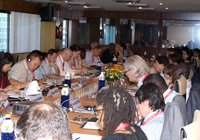
At the third meeting, the Task Team took
stock of all the advocacy and activities
conducted by Task Team members against
travel restrictions and noted that there
indeed is much greater momentum toward
their elimination. Credit: UNAIDS
The third meeting, which took place from 24-26 June, was opened by Francisco Elías de Tejada Lozano, former Spanish Ambassador to the Global Fund, Spanish Ministry of Foreign Affairs, and Francesco Frangialli, Secretary-General of UNWTO. Frangialli underlined that travel restrictions based on HIV status are discriminatory, and are a major concern to the entire tourism sector.
“HIV is not something that transmits through the air. If there are going to be restrictions, they have to be rational and reflect legitimate public health concerns. For HIV, what’s needed is prevention information and dialogue,” said Frangialli.
At the third meeting, the Task Team took stock of all the advocacy and activities conducted by Task Team members against travel restrictions and noted that there indeed is much greater momentum toward their elimination.
For example, civil society groups conducted significant advocacy leading up to the High-Level Meeting on AIDS at the UN General Assembly in June. At that meeting, both UN Secretary-General Ban Ki-Moon and UNAIDS Executive Director Peter Piot called for the end of HIV-related travel restrictions in their speeches at the opening session of the General Assembly. “Stigma and discrimination around AIDS remain as strong as ever: and in this context I join my voice with the Secretary General and I call on all countries to drop restrictions on entry to people simply because they are living with HIV,” said Dr Piot.
Task Team members also underlined during the third meeting that ongoing awareness-raising is needed, and that the Task Team’s work has to be followed by intense country-level action that leads to the elimination of travel restrictions.
“At this point in the epidemic, with over 25 years of experience, it’s hypocrisy if there’s no change and governments say that they’re committed to ending stigma and discrimination,” said Craig McClure, Executive Director of the International AIDS Society.
Susan Timberlake, Task Team Co-chair and Senior Human Rights and Law Adviser at UNAIDS, stated that more effort is needed to ensure that tourists, migrants and other mobile populations are addressed in national AIDS responses.
“Countries need to understand that any HIV vulnerability related to mobility is not just about tourists and migrants, it is also about nationals, entering, departing and re-entering. If governments really want to reduce HIV vulnerability related to mobility they should ensure that all mobile people benefit from appropriate HIV programmes and services. In the era of Universal Access and increasing globalization, no comprehensive AIDS response should leave out people on the move,” she said.
Restrictions on the entry, stay and residence of people living with HIV will be highlighted during a Special Session at the International AIDS Conference in Mexico this August, as well as the Global Forum on Migration and Development in the Philippines in October. The final recommendations of the Task Team will be presented in a report at the next meeting of UNAIDS Programme Coordinating Board in December 2008 and to the board of the Global Fund of Fight AIDS, TB and Malaria in November.
Third meeting of the International Task Team on H
Feature stories:
HIV-related travel restrictions (04 March 2008)
Second meeting of the International Task Team on HIV-Related Travel Restrictions (April 2008, OHCHR web site)
External links:
Global Database on HIV-related Travel Restrictions
Global Fund 16th Board Meeting – Acknowledgement of the UNAIDS Commitment to Create a Task Team on Travel Restrictions
IAS Policy Statement
World Tourism Organization (UNWTO)
Multimedia:
Listen to Shaun Mellors, Senior Technical Adviser, Human Rights, International HIV/AIDS Alliance
Listen to Gracia Violeta Ross Quiroga, National Chair, Bolivian Network of People with HIV/AIDS
Publications:
Entry Denied: Denying entry, stay and residence due to HIV status – Ten things you need to know (pdf, 2.90 Mb)
Update and information note to the UNAIDS Programme Coordinating Board (23 - 25 April 2008) and the Board of the Global Fund to Fight AIDS, Tuberculosis and Malaria (28-29 April 2008) (pdf, 133 Kb)






